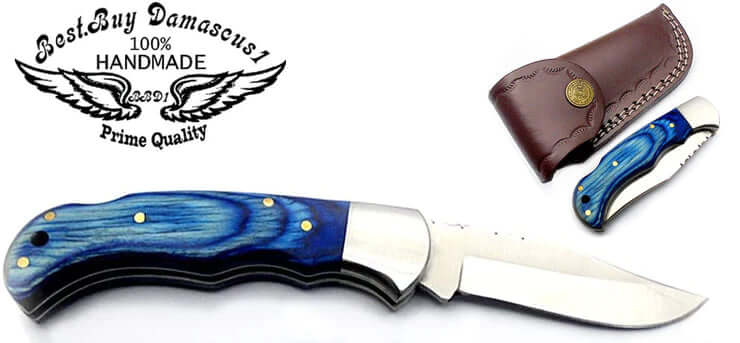
How to Care for a Damascus steel Knife
Posted by Best.Buy. Damascus1 on
Damascus knives are well known for their contrasting light and dark marble design, made from different metals with unique properties. It is important to care for it properly to ensure that its parts do not rust. In general, it is necessary to ensure that the blade remains not only dry but also coated with a lubricating layer of wax or oil to block excess moisture.
Here's how you can look after your knife:
- Be Aware Of When And Where You Use Your Damascus Knife.
During production, the steel is chemically treated to reveal the unique patterns of Damascus knives. This process involves both welding and engraving the patterns to bring out the details created during the welding process. As a result, both dark (oxidized) and light/gloss (oxidation-resistant) patterns are visible on the blade, representing different levels of oxidation. For this reason, the blade is particularly susceptible to damage when used on acidic foods (e.g., fruit) and in wet/humid environments.
- Avoid Abrasive Materials But Keep The Blade Dry.
Wash and dry the blade immediately after use (avoiding abrasive materials such as rough cloths, metal polishes, and steel wool), taking care not to rub the blade roughly. Using an abrasive or metal cleaner may remove the etched oxidation that you want the pattern to show on your Damascus Knife. To avoid abrasion of the blade, it is better to use softer materials such as microfibre or cotton cloth when drying.
If the engraving is significantly altered, we recommend sending the blade back to the manufacturer for re-engraving.
- Lubrication of Carbon Steel Damascus Blades.
After cleaning and drying the knife, lubricate it with wax or oil to prevent moisture from affecting the blade.
Most Damascus knives are made from high-carbon steel, which means that the steel contains relatively low levels of chromium. Carbon steel (even Damascus carbon steel) can rust if not properly cared for.
To prevent rust or discoloration, it is necessary to make sure that the blade is clean and dry.
- Store It Properly So That It Does Not Rust.
When not in use, make sure the blade is stored in a dry environment, such as a box or padded zipper case, to protect it from moisture or temperature changes.
With this in mind, you should also avoid using a dehumidifier bar in the storage container, as too low a humidity level can cause the natural materials, such as the wood of the handle, to crack.
By taking care of your Damascus blade, your product will truly stand the test of time. If your blade handle is made of synthetic material, you won't have to worry about humidity, just make sure that moisture doesn't affect the blade. We recommend that you put a small cleaning kit in your storage item to make it easy, effortless, and part of your daily routine! It doesn't have to be anything fancy, just the basics will do! Damascus1 is the best platform to find a complete range of pocket knives, kitchen knives set, folding knives and many more. Visit our official website to explore more.

